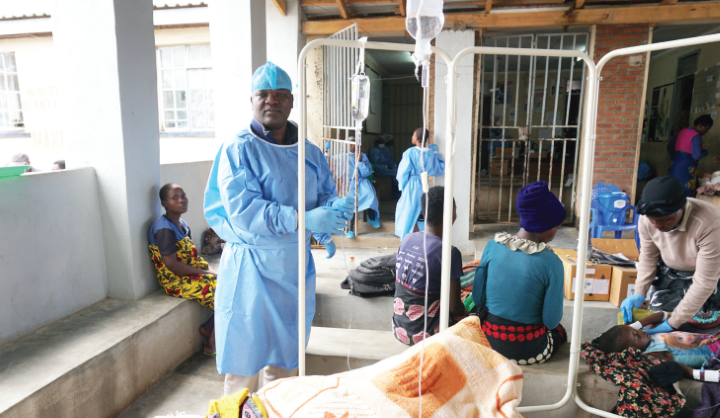Backstreet abortions risking women’s lives
Aida (not real name) is a 31-year-old married mother of four. Her last born was a result of an unplanned pregnancy.
Aida, of Bwelero Village in Traditional Authority (T/A) Mankhambira, in Nkhata Bay, says she and her husband had agreed to terminate the pregnancy when it was less than two months old. But when she went to the hospital, they refused to assist her.
“When I was denied safe abortion services at the hospital, I went back home and told my husband. We then agreed to visit a herbalist for help,” she says.
Aida says the herbalist, who lives in a village next to theirs, gave her green leaves to chew. When she chewed the leaves, she went home.
“When I arrived home, I started feeling pain in my stomach. A few minutes later, blood started coming out.
“Later, the blood started flowing heavily and when my husband saw that I was losing a lot of blood, he hired a taxi and took me to the hospital. I was admitted and accessed post-abortion care services,” Aida recounts.
Aida is one of the hundreds of women in the country who carry out illegal and unsafe abortions.
A visit to both government and private clinics in the district revealed that medical personnel get many cases of women who seek abortion services, claiming they are in school and cannot afford to look after children.
“Accidental pregnancy among couples practising child spacing is another reason couples come to ask for abortion services,” says Austin Mwafulirwa, sexual reproductive health focal officer in the district.
Mwafulirwa says since January this year, for example, Nkhata Bay District Hospital alone has handled 57 post-abortion care (PAC) cases.
Some medical personnel say they cannot help women with safe abortions because abortion is illegal in the country. Sections 149, 150 and 151 of the Penal Code prohibit abortion, unless the life of the mother is in danger, but permits PAC.
Mwafulirwa says women who are denied safe abortion resort to aborting illegally, but often get back to hospital with complications emanating from unsafe abortion.
He points out that in 2009, Nkhata Bay Hospital alone treated 103 PAC cases. In 2010, the figure rose to 117 and in 2011, the hospital treated 92 cases.
“We have so far registered 57 PAC cases since January this year, and the figure is likely to increase,” says Mwafulirwa.
He observes that some health centres across the district are equally overwhelmed by complications resulting from backstreet abortions.
In an attempt to counter maternal deaths and rapid population growth, the district health office has embarked on an ambitious programme aimed at making communities access family planning services right in their localities.
District family planning coordinator, Diana Mwanyongo, says with funding from United Nations Population Fund (UNFPA), the programme seeks to avert population explosion and unplanned pregnancies by providing contraceptive services to people at their doorstep.
“This is why we have trained health surveillance assistants across the district in how to administer modern contraceptive methods,” she says.
The Coalition for Prevention of Unsafe Abortions in Malawi (Copua), which is fighting for the legalisation of abortion, describes the law as outdated, saying it needs to be repealed as a way of minimising maternal deaths in the country.
Darlington Harawa, Copua’s community mobilisation task force chairperson, claims that 18 percent of maternal deaths emanating from unsafe abortion in the country are as a result of the anti-abortion law as it denies women access to safe reproductive health care.
According to the United Nation’s Millennium Development Goal (MDG) monitor, Malawi has been challenged to achieve the MDG goal of a 75 per cent reduction in maternal mortality by 2015.
Global recommendations offer three major steps to improve maternal and reproductive health for women: increasing access to family planning, increasing access to quality care of pregnancy and childbirth, and increasing access to safe abortion services within the current law, including the provision of PAC for complications of induced and spontaneous abortion (Women Deliver 2010).
Harawa says Malawi, despite having never been at war since independence, is said to be the worst country affected by maternal deaths in southern Africa, with 16 mothers estimated to be dying of pregnancy-related complications every day.
The statistics are equated to countries which are synonymous with wars such as Sudan, Sierra Leone and Afghanistan.
“Research has revealed that 18 per of such deaths in Malawi are due to unsafe abortions as the country’s laws bar abortion unless the life of the mother is in danger,” says Harawa.
It is against this background that Copua is on a nationwide tour sensitising the communities to the need to repeal the anti-abortion law.
Harawa says the anti-abortion legislation infringes on women’s rights to access quality reproductive health care, adding: “The law has failed to achieve its intended purpose, hence the need to have it scrapped off.”
He questions the wisdom of denying a mother safe abortion services for unwanted pregnancy on point of law, only to treat her of complications later on when the same woman aborts on her own using crude methods.
“Government spends millions of kwacha in PAC services, instead of legalising the law to avoid losing lives of our dear women and girls and also avoid losing huge sums of money in PAC services,” Harawa says.—Malawi News Agency.





